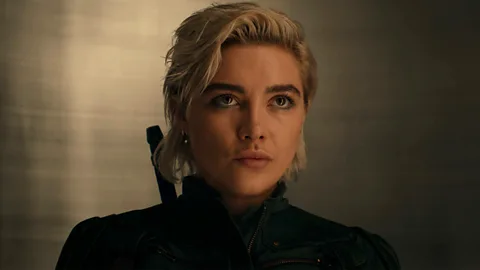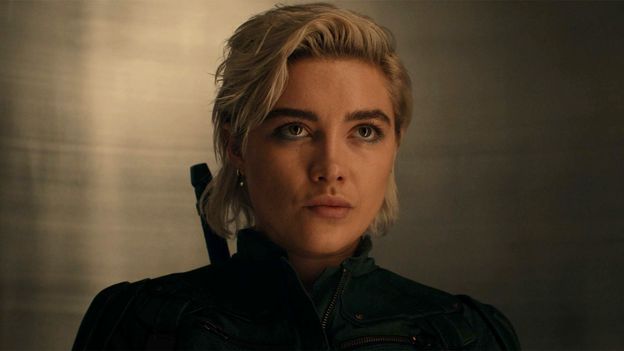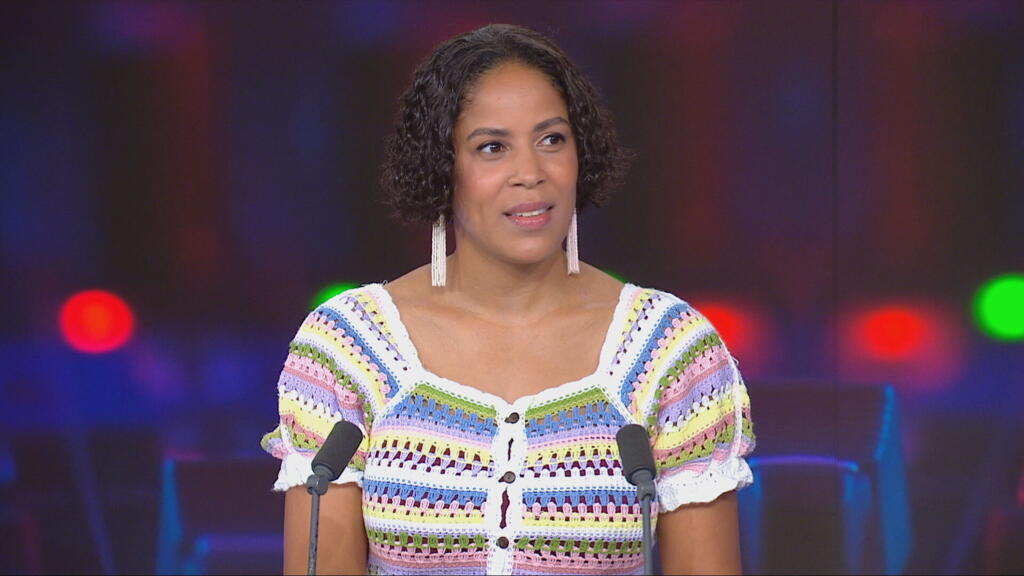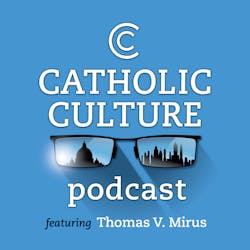 Disney
DisneyThe most recent within the superhero franchise “is scrappy, scruffy-looking, down-to-earth enjoyable”, with a “charismatic” Florence Pugh at its centre, writes Nicholas Barber.
Ever since Avengers: Endgame got here out in 2019, the subtitle has felt much more acceptable than the studio may need appreciated. It isn’t that Marvel hasn’t had any hits within the 2020s, however it’s not releasing an unbroken chain of talked-about blockbusters, neither is it holding audiences invested in a narrative that threads by way of all of them. That exact recreation has come to an finish.
The Marvel movies which have labored greatest since Endgame are those which have moved furthest away from the sample set by the so-called “Infinity Saga” – the primary 22 instalments within the franchise, which pivoted round a struggle towards uber-villain Thanos. Final yr’s R-rated Deadpool & Wolverine used nearly no characters from the primary Marvel Cinematic Universe (MCU); the postmodern Spider-Man: No Manner House paid tribute to the Spider-Man movies which weren’t made by Marvel Studios; and the most recent Marvel movie, Thunderbolts*, has its personal distinct identification, too. That is to not counsel that it’s not part of the MCU. The truth is, one in all its intelligent touches is that it particularly addresses how gloomy individuals really feel in a world the place Iron Man, Thor and Captain America are not round. However the director, Jake Shreier, and the screenwriters, Eric Pearson and Joanna Calo, have provide you with an unruly tackle the superhero style which makes it probably the most refreshing MCU providing in years.
The bottom line is that, quite than making an attempt to be as shiny and expansive because the Infinity Saga movies, Thunderbolts* is scrappy, scruffy-looking, down-to-earth enjoyable. It is not the epic story of indestructible titans saving the Universe, not to mention the multiverse; it is a comedy-tinged caper about bungling secret brokers who’re deemed a legal responsibility by the very firm that used to make use of them. It isn’t a brand new state of affairs: after The Bourne Id, there have been numerous motion movies by which disavowed spies dodged their erstwhile handlers. However Thunderbolts* stands out as a result of it has a complete group of such spies: a ragtag bunch of depressive, dysfunctional loners who should work collectively and may’t cease grumbling about it. What’s particularly uncommon in regards to the movie, in Marvel phrases, is that its premise can be viable even when the characters weren’t super-powered. And, certainly, they are not all that super-powered in comparison with the aforementioned Captain America and Thor. A part of their enchantment is that they are often killed by bullets and trapped in rooms with locked doorways, which makes them quite a bit simpler to narrate to than Norse gods.
There is a lesson there that the makers of such disappointments as Eternals and The Marvels ought to have learnt. It isn’t the characters’ powers that depend; it is their personalities. In Thunderbolts*, these characters are Yelena (Florence Pugh), a Russian murderer who was the adoptive sister of Scarlett Johansson’s Black Widow, and is now deeply depressing about all of the senseless violence in her life; her adoptive father, Pink Guardian (David Harbour), a washed-up slob who’s nostalgic for his days as a nationwide hero; the bionic-armed Winter Soldier (Sebastian Stan), who was Captain America’s sidekick in World Struggle Two, and nonetheless appears uncomfortable within the twenty first Century; John Walker (Wyatt Russell), an embittered super-soldier who was speculated to be the brand new Captain America, however wasn’t as much as the job; the confused, conflicted Bob (Lewis Pullman), one other flawed try and create a Captain America substitute; and Ghost (Hannah John-Kamen), who’s a science experiment gone incorrect – however who, in contrast to the opposite characters, is not very effectively outlined past that. In numerous methods, they’re all linked to one in all Marvel’s most memorably slippery villains, Valentina Allegra de Fontaine (Julia Louis-Dreyfus), a businesswoman with all of the brittle, condescending confidence that you simply would possibly count on from the reliably glorious star of Seinfeld and Veep.
De Fontaine, it appears, has been behind a number of superhero-related black ops. Now that her political opponents are closing in on her, she decides to destroy all of the proof of her shady undertakings, together with the individuals who carried them out. And so it’s that Yelena and the others swap from making an attempt to kill one another to making an attempt to maintain one another alive. They turn out to be a sort-of staff, however they are not certain whether or not or to not name themselves the Thunderbolts, so the asterisk within the title signifies that it is only a placeholder identify till they’ll consider one thing higher.
Thunderbolts*
Forged: Florence Pugh, Sebastian Stan, Wyatt Russell, Olga Kurylenko, Lewis Pullman, Geraldine Viswanathan, Chris Bauer, Wendell Pierce, David Harbour, Hannah John-Kamen, Julia Louis-Dreyfus
One small snag is that a lot of the characters’ again tales are in different movies, and in a TV collection, The Falcon and the Winter Soldier, quite than in Thunderbolts* itself. One other snag is that the gang’s pursuit by De Fontaine’s troops accounts for almost all of the movie’s operating time, so there aren’t many set items that have not been within the trailers already. Alternatively, superhero movies are not often so tightly centered, and infrequently progress so seamlessly from scene to scene, with no pausing for breath, and no sudden jumps to totally different ends of the Earth. Captain America: Courageous New World, which got here out in February, was much like Thunderbolts* in that it revolved round Washington DC politics, and adopted on from The Falcon and the Winter Soldier. However that movie was a messy sprawl, whereas this one is so neatly plotted which you can get the gist and benefit from the journey whether or not you are a Marvel nerd or not.
The underlying points in Thunderbolts* are simply as centered because the narrative. The characters all need to take care of the disgrace and trauma of their troubled pasts – and this theme is there from the opening scene to the requisite Remaining Battle, which is barely rushed, however stylishly surreal sufficient to recall two mind-bending movies written by Charlie Kaufman, Being John Malkovich and Everlasting Sunshine of the Spotless Thoughts. In between, the characters’ guilt is explored in some touching and surprisingly brutal sequences, in addition to in some sharply-scripted, briskly-edited and skilfully-performed comedian scenes.
At each ends of the spectrum, Pugh delivers a efficiency which might win her awards if it weren’t in a superhero movie. She delivers her punchlines with professional timing, particularly when she is bickering and bantering with Pink Guardian. However she will be able to additionally radiate uncooked emotion – and all whereas sustaining an honest Russian accent and cartwheeling by way of her acrobatic struggle scenes. When it comes all the way down to it, that is why Thunderbolts* is so significantly better than most of Marvel’s post-Endgame movies. It isn’t simply because it is a rough-edged, big-hearted spy thriller about lovably clueless anti-heroes. It is as a result of it has an actor as charismatic as Pugh at its centre.





